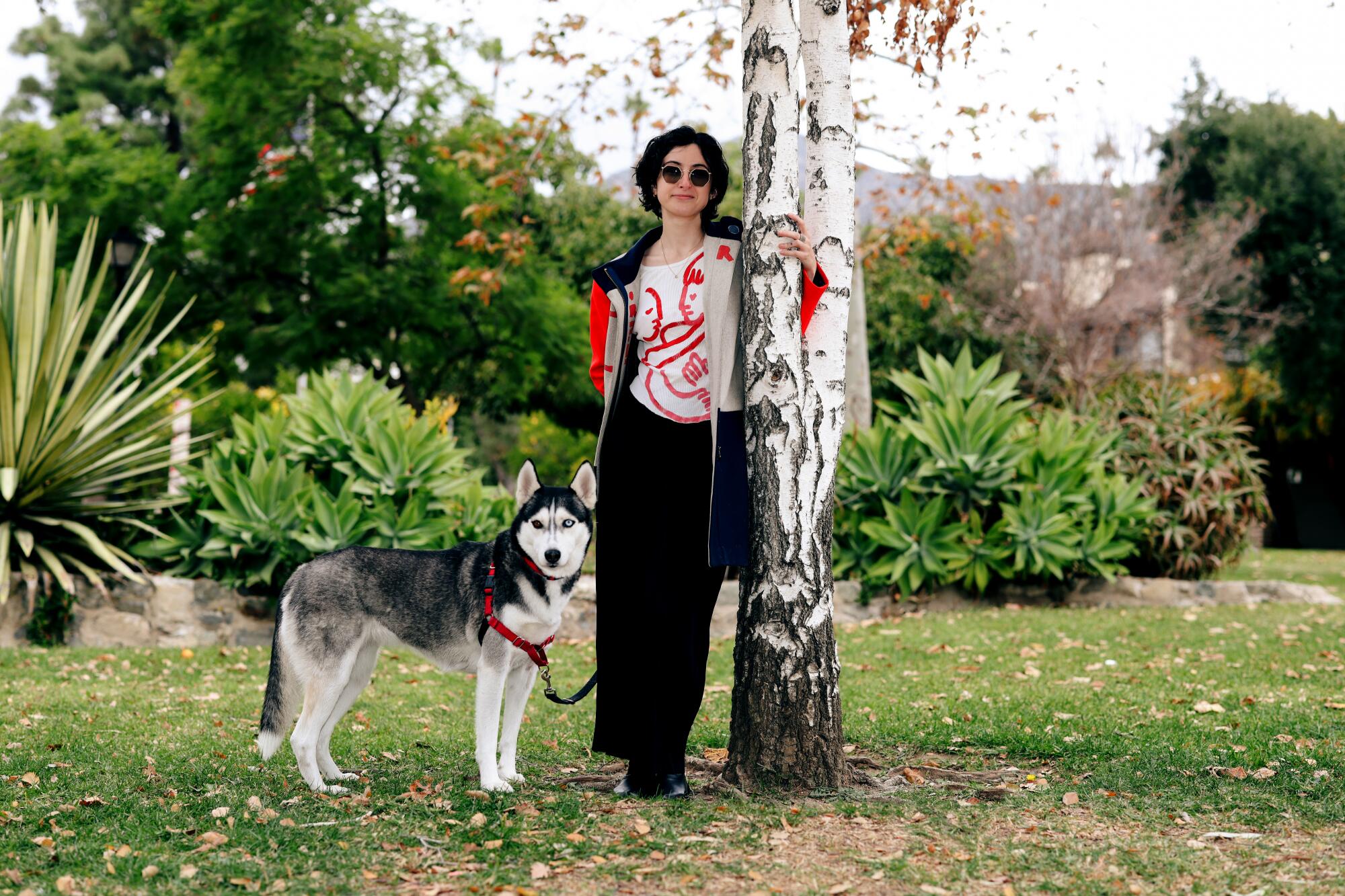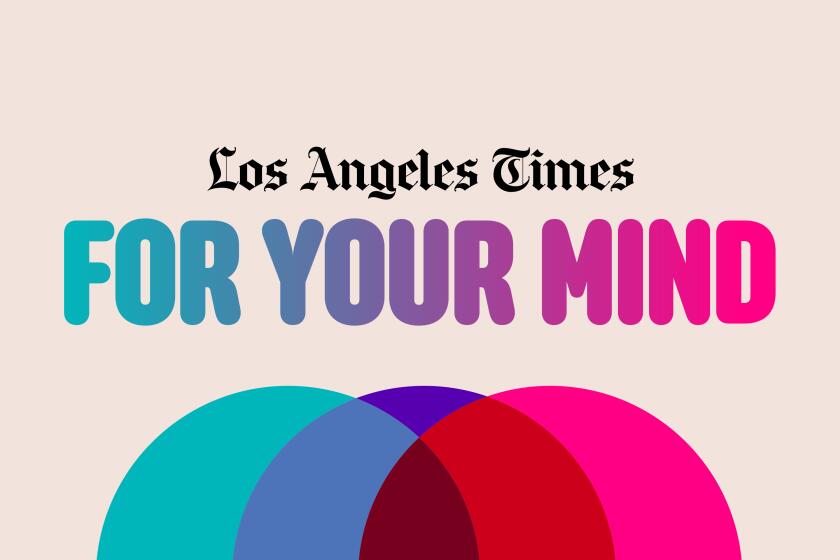
- Share via
I wasn’t sure what I would find when I reached out to the person behind an online educational business known as “Consent Wizardry.”
I celebrate our culture’s (woefully recent) conversation about the importance of consent, and I am, as those who know me will attest, all about wizards. But even armed with the knowledge that its founder, Mia Schachter, offers classes exploring consent that are, in the words of someone I trust, “awesome,” I wasn’t quite sure what I was getting myself into.
A legalistic lecture? A politically correct guide to sex? A magical journey into the cavernous realms of our conscious and unconscious relationship with “yes” and “no”?
Well, maybe not magical, at least not in the wand-waving sense, but definitely a journey. Schachter, 33, believes that consent, or rather our underdeveloped sense of it, lies at the bottom of many of society’s ills, physical and cultural. And for the frequency with which terms like “modalities” and “polyvagal theory” appear on Consent Wizardry’s website, the purpose of Schachter’s work is pretty basic.
Whether we acknowledge it or not, the fact is that we give, withhold and/or ignore our qualms about consent every day. When we agree to work weekends, or get involved in someone else’s crisis, or submit to whatever plan our peer group has made. Sometimes it’s fine, but sometimes we find ourselves filled with resentment over doing something we really did not want to do because we didn’t think we could or should say “no.”
Wouldn’t it be better if we understood what we wanted or were willing to do and were able to articulate it firmly? What if we stopped making assumptions about what others were willing to do and just asked?
“Consent is all around us,” Schachter, who uses they/them pronouns, said recently over coffee. “Not just in the sexual realm but everywhere.”
If you were in a newsroom during #MeToo, you know it wasn’t a witch hunt; it was like watching a mile-high dam break.
Two to five times a week, Schachter teaches classes with titles including “What is consent?,” “Practice saying no” and “Self-consent and the nervous system.” Consent Wizardry’s Instagram account is full of posts about setting boundaries in all areas of life — themes Schachter also explores in a podcast called “Share the Load.”
Schachter is very clear that they are not a mental health professional; Consent Wizardry was built on the sort of winding, creative career emblematic of the culture’s recent shifts in form and content. “My background is in theater, acting, writing, directing,” Schachter said. “But I was always interested in feminism and gender issues. In my 20s, in my mind was, ‘If I don’t become a playwright, I’ll become a sex educator.’”
Yet Schachter’s career took a few more turns before fulfilling that prediction. A few years ago, they moved back to hometown L.A. to write for television — beginning with a romantic comedy about someone whose job was to choreograph sex scenes. “Then all these articles came out about intimacy coordinators, and my writing partner and I realized, ‘Oh, this is a real job. We’ll need to do some research.’”
A job as a casting assistant on “The Affair” in 2019 introduced Schachter to the show’s intimacy coordinator, Amanda Blumenthal. “I asked if I could interview her for [the] movie, and then I asked her if she could train me.”
Schachter was just beginning to gain momentum as an intimacy coordinator — on series including “Seal Team,” “Party of Five,” “Insecure” and “Perry Mason” — when COVID-19 shut down production. While writers could still write and actors could, with the aid of Zoom, still act, intimacy coordinators instantly became superfluous. Schachter had to pivot again.
Like the rest of the world, they went digital, and like many of us, they also began looking deeper into what it is they were doing.
“People kept asking me very basic questions,” Schachter said. “And responding with more when I tried to answer them.” The questions they were asking were about consent.
Self-care has become synonymous with shopping for skincare, candles and even Botox. But self-care doesn’t have to be a consumerist endeavor.
Answering those questions required looking inward — back to experiences that had made Schachter uncomfortable too. “The big revelation was the way I had been violating my own boundaries, that I was not listening to my body. [I was doing] a lot of mind-over-matter thinking, telling my body, ‘Suck it up.’ When I started listening to myself, my body felt better.”
The word ”wizardry” is just Schachter’s way of describing that moment of “synchronicity.”

Consent, according to Schachter, is about acknowledging boundaries — to yourself and with others. Those boundaries can shift, will probably shift, but the key is communication with yourself and other people. We all need to be able to give — and ask for — consent thoughtfully. As in: We actually have to think about it.
“This is what’s important to me. I want to make this as widely available as possible,” said Schachter.
A business that sprang up in response to clients’ questions keeps expanding in the same way — more questions lead to new classes.
“I have an upcoming class targeted to people who identify as ‘people-pleasers,’” Schachter said. Another will examine romantic comedies as “indoctrination for millennials as children.”
While Schachter’s work as an intimacy coordinator was limited to aiding performance — in addition to TV, they have worked with several productions at the Geffen — consent is a concept they believe applies in every field of work. Increasingly, Consent Wizardry has been teaming with companies and organizations looking to improve workplace mood and health.
Mental health news and resources to help you cope with the stress of daily life, anxiety and more.
“I now offer a professional wellness package for companies,” Schachter said. “They’re looking for better workflow, better communication and burnout prevention. Recognizing your own limitations and being able to communicate that and having it received well.
“There are external and internal capitalist pressures to work yourself to the bone and wear it like a badge of honor,” they added, “and it’s not working. It’s stifling creativity and leading to resentment.”
Acknowledging the external pressures on true consent, including but not limited to capitalism, sexism, racism and homo-/transphobia, lifts Consent Wizardry out of self-help and into the realm of the-personal-is-political.
Consentwizardry.com identifies itself as “an integrative, somatic, anti-binary, trauma-informed, abolitionist approach to consent education and intimacy coordination.” It’s an eyeful of terms, which many would lump in under the increasingly meaningless, always dismissive term “woke.”
But that would be reductive. There is no denying that political and cultural forces create expectations or agendas designed to make people feel there are things they should do. And self-knowledge, another deep-seated tenet of Schachter’s work, has been the goal of art and science since the Enlightenment. (Though until very recently, civilization tended to be far more interested in white educated male self-knowledge than anyone else’s.)
By framing the problem of self-actualization around consent, however, Schachter makes it both more concrete and much more universal.
CBD butt balm, charcoal cheese and other ridiculous wellness products are losing their luster as Gen Z shoppers exhibit a more critical eye.
Schachter begins their class on the definition of consent by asking when participants were taught its meaning; I have to admit I never really was. Sexual consent was simply the absence of (loud, emphatic and repeated) objection, and even then it applied almost exclusively to intercourse.
Consent as a descriptor for any other situation simply did not apply — never mind its obvious application to so many facets of life. “We all do things we don’t want to do, for a variety of reasons,” Schachter said. “Sometimes it isn’t worth the time or effort to object. But you need to know that you have a real choice.”
That is the sticky part of so many issues we are grappling with at the moment, whether they be sexual harassment (why did she continue to work with him?) or worker burnout (but 60-hour weeks are part of the job!). Without choice, there can’t really be consent.
Schachter’s career as an intimacy coordinator continues to inform the business of teaching consent. By the same token, consent has become a way to reframe the intimacy work.
“After the Harvey Weinstein scandal, I think the media saw intimacy coordinators as some sort of a solution,” Schachter said, “which contributed to the idea that we are presuming mal-intent and we’re essentially cops. And we get resistance based on those assumptions.”
But, they said, hiring an intimacy coordinator is neither a panacea nor an accusation; it is simply filling a practical role — to facilitate the filming of intimate scenes. “We don’t set rules, we talk to the performers, and the director, and the camera operators, and the costume department, about how to choreograph scenes in a way that everyone is comfortable.” What they come up with together is a framework for consent.
If you were in a newsroom during #MeToo, you know it wasn’t a witch hunt; it was like watching a mile-high dam break.
Most of the time, Schachter experiences support on set. “People want to know how to make it comfortable, they want to know the boundaries, because that’s when people do their best work.”
The same is true in life, which is the whole point of Consent Wizardry. “Knowing that a person can and will say no and being able to receive a ‘no’ without reading other things into it is very liberating,” Schachter said.
Sometimes it can even feel like magic.
More to Read
The biggest entertainment stories
Get our big stories about Hollywood, film, television, music, arts, culture and more right in your inbox as soon as they publish.
You may occasionally receive promotional content from the Los Angeles Times.















